中考英语专题 专题十二动词的时态
初中易考知识点动词的时态和语态变化规则
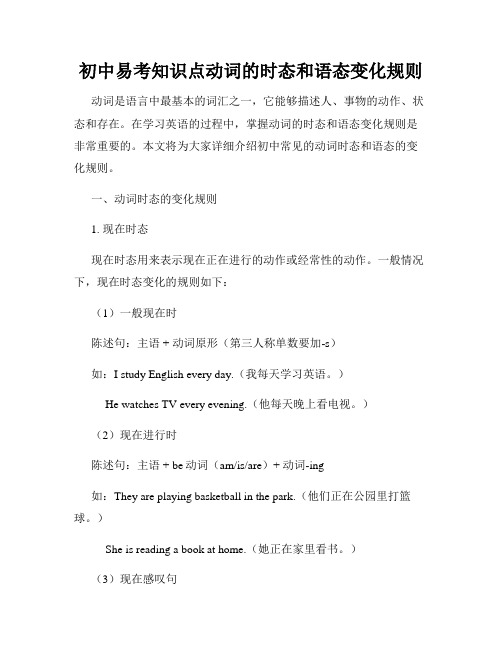
初中易考知识点动词的时态和语态变化规则动词是语言中最基本的词汇之一,它能够描述人、事物的动作、状态和存在。
在学习英语的过程中,掌握动词的时态和语态变化规则是非常重要的。
本文将为大家详细介绍初中常见的动词时态和语态的变化规则。
一、动词时态的变化规则1. 现在时态现在时态用来表示现在正在进行的动作或经常性的动作。
一般情况下,现在时态变化的规则如下:(1)一般现在时陈述句:主语 + 动词原形(第三人称单数要加-s)如:I study English every day.(我每天学习英语。
)He watches TV every evening.(他每天晚上看电视。
)(2)现在进行时陈述句:主语 + be动词(am/is/are)+ 动词-ing如:They are playing basketball in the park.(他们正在公园里打篮球。
)She is reading a book at home.(她正在家里看书。
)(3)现在感叹句助动词do/does + 主语 + 动词原形如:Do you like ice cream?(你喜欢冰淇淋吗?)Does he play the piano very well?(他弹钢琴弹得很好吗?)2. 过去时态过去时态用来表示在过去发生的动作或存在的状态。
一般情况下,过去时态变化的规则如下:(1)一般过去时陈述句:主语 + 动词过去式如:She studied hard last night.(她昨晚努力学习。
)They visited their grandparents yesterday.(他们昨天去看望了他们的祖父母。
)(2)过去进行时陈述句:主语 + was/were + 动词-ing如:He was playing basketball when I called him.(当我给他打电话时,他正在打篮球。
)We were watching a movie at that time.(那时我们正在看电影。
英语动词时态总结

英语动词时态总结一、一般现在时(Simple Present Tense)表示经常性动作、惯性动作、普遍真理等。
1. 动词原形:- I, you, we, they + 动词原形- He, she, it + 动词原形 + -s/-es2. 特殊用法:- 表示客观事实或普遍真理:The sun rises in the east.- 表示经常性或惯性动作:I often go for a run in the morning.二、一般过去时(Simple Past Tense)表示过去某个时间发生的动作或存在的状态。
1. 动词过去式:- 一般情况下,动词过去式在词尾加-ed。
- 不规则动词过去式需单独记忆。
2. 特殊用法:- 表示过去的经历或事件:We traveled to France last summer.三、一般将来时(Simple Future Tense)表示将来发生的动作或存在的状态。
1. will/shall + 动词原形:- I, you, he, she, it, we, they + will + 动词原形- I, we + shall + 动词原形2. 特殊用法:- 表示决定、承诺、意愿等:I will help you with your homework.四、现在进行时(Present Continuous Tense)表示现在正在进行的动作。
1. be(am/is/are) + 动词-ing:- I + am + 动词-ing- He, she, it + is + 动词-ing- You, we, they + are + 动词-ing2. 特殊用法:- 表示现在进行的动作:I am studying for the exam.五、过去进行时(Past Continuous Tense)表示过去某个时间正在进行的动作。
1. was/were + 动词-ing:- I, he, she, it + was + 动词-ing- You, we, they + were + 动词-ing2. 特殊用法:- 表示过去正在进行的动作:She was watching TV when I arrived.六、将来进行时(Future Continuous Tense)表示将来某个时间正在进行的动作。
最新英语中考语法专题复习---动词的时态课件

by her favorite singer.
A. misses B. missed C. will miss D. is missing
( ) 2. I don’t know the words to a lot of songs, but I do know some folk
songs that my grandma _______ me at an early age.
picnic.
A. improve
B. improves
C. improved
D. will improve
( A) 3. —Is Li Mei a teacher?
—Yes, she is. She ________ at a village school.
A. teaches
B. is teaching
时间状语标志:recently,lately,since+时间 点..,for+一段时间..,in the past few years,already , yet,ever,never,just刚刚 ,before,so far到目 前为止......
14
1. 现在进行时的构成
现在进行时的构成:主语+be(am/is/are)+动词的现在分词。动词的 现在分词的构成规则如下:
构成规则
例子
一般在词尾加ing
sleep—sleeping, work— working, study—studying
以不发音的e结尾的动词,需要 dance—dancing, come—
C. taught
D. will teach
主将从现
在时间、条件等状语从句中,用一般现在时表示将来
湖南中考英语一轮复习(课件):专题十二 动词的语态
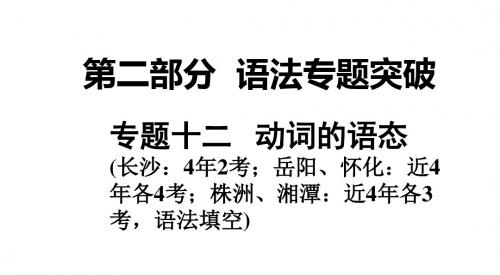
综合提升
湖南4年真题面对面
1. (2017株洲29题)The singer _B__ while still at
school.
A. has discovered
B. was discovered
C. discovered
2. (2017岳阳29题)Teenagers __A_ decide for
拓展
3. 某些系动词如feel, prove, smell, taste, sound等 加形容词。如:
The food tastes delicious. 这种食物尝起来很美 味。
4. be worth doing sth. 意为“值得做某事”。如: The book is worth reading. 这本书值得一读。
The pen writes well. 这支钢笔很好写。
拓展
2. 动词need, require, want, deserve等后接v.
-ing,相当于sth. need (s) / require (s) /
want(s)/ deserve (s) to be done。如:
The car needs cleaning. =The car needs to be cleaned. 这辆汽车需要清洗了。
be (was/
were)+动词 的过去分词
The flying disk was invented by college students. 这种飞碟是大学
考)
生们发明的。
语态
被动结构
例句
含情态动词的被动 语题态,(22001167怀岳化阳2289题,情 +的b态 过e+动 去动词 分词
2015中考英语—第一部分 语法专题研究:专题十二 动词的语态
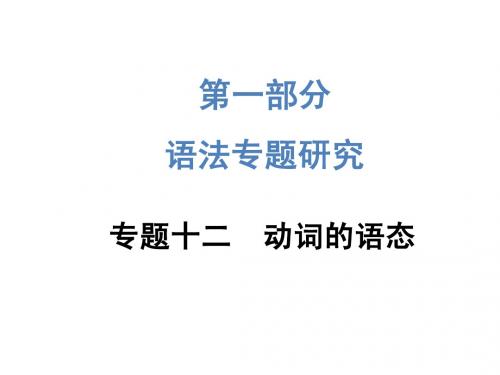
(3)表示“发生”的happen或take place,无被
动结构。如:
The story happened on a cold night. (√) The story was happened on a cold night.(×) 故 事发生在一个寒冷的夜晚。
3. 主动语态变被动语态的方法 (1)转换图示: 主动语态变被动语态的方法: 转换图示:
C. can be kept
B. keeps
D. kept
【 解析 】考查情态动词的被动语态。 句意:不要担心,你的包 _____ 这儿直 到你回来,请愉快地购物。will keep一 般将来时; keeps一般现在时; can be kept情态动词的被动语态;kept一般过 去时。此处应该是包被保存,应使用 被动语态,故选C。
一般现在 be(am/is/are) 时(考查 +动词的过去 3次) 分词 一般过去 be(was/were) 时(考查 +动词的过去 1次) 分词
时态
被动结构
例句
一般将来 will/shall+be+ The bridge will be 时(考查 动词的过去分 finished in a month. 这 2次) 词 座桥将在一个月内竣工。 情态动词 情态动词 (考查3 +be+过去分 次) 词 Such work can be done n in an hour or so.这项 工作可以一个小时左右 做完。
2. —A talk on American culture ____ in the school hall yesterday afternoon. —It’s a pity. I missed it. A. gave C. has given B. was given D. is given
英语十二时态总结
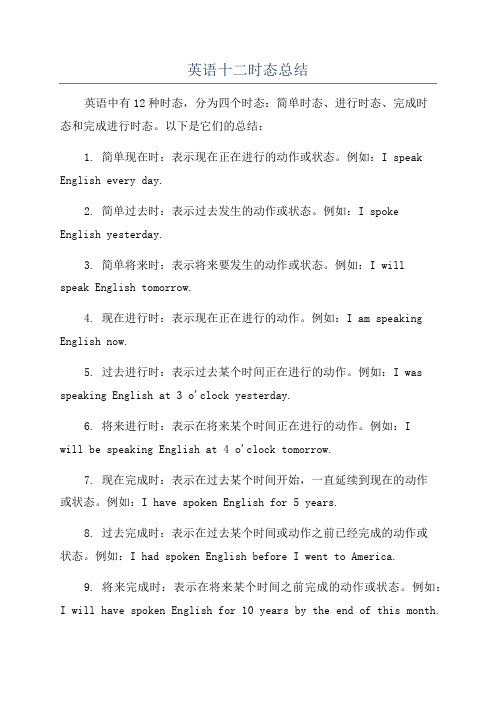
英语十二时态总结英语中有12种时态,分为四个时态:简单时态、进行时态、完成时态和完成进行时态。
以下是它们的总结:1. 简单现在时:表示现在正在进行的动作或状态。
例如:I speak English every day.2. 简单过去时:表示过去发生的动作或状态。
例如:I spoke English yesterday.3. 简单将来时:表示将来要发生的动作或状态。
例如:I willspeak English tomorrow.4. 现在进行时:表示现在正在进行的动作。
例如:I am speaking English now.5. 过去进行时:表示过去某个时间正在进行的动作。
例如:I was speaking English at 3 o'clock yesterday.6. 将来进行时:表示在将来某个时间正在进行的动作。
例如:Iwill be speaking English at 4 o'clock tomorrow.7. 现在完成时:表示在过去某个时间开始,一直延续到现在的动作或状态。
例如:I have spoken English for 5 years.8. 过去完成时:表示在过去某个时间或动作之前已经完成的动作或状态。
例如:I had spoken English before I went to America.9. 将来完成时:表示在将来某个时间之前完成的动作或状态。
例如:I will have spoken English for 10 years by the end of this month.10. 现在完成进行时:表示在过去某个时间开始,一直延续到现在,且正在进行的动作或状态。
例如:I have been speaking English for 5 hours.11. 过去完成进行时:表示在过去某个时间点之前已经开始,一直延续到过去某个时间点,且正在进行的动作或状态。
动词时态详解

动词时态详解动词时态是指动词表示的动作或状态所发生的时间。
在英语中,有多种不同的时态,每种时态都有其独特的用法和含义。
以下是对一些常见动词时态的详细解释:1. 现在时态 (Present Tense)- 一般现在时 (Simple Present): 用于表达经常性的动作、客观事实、普遍真理等。
- 现在进行时 (Present Continuous): 用于表示正在进行的动作。
- 现在完成时 (Present Perfect): 用于表示过去发生的动作与现在的关系,强调结果或经验。
- 现在完成进行时 (Present Perfect Continuous): 用于表示过去开始并一直持续到现在的动作。
2. 过去时态 (Past Tense)- 一般过去时 (Simple Past): 用于表达过去发生的动作或状态。
- 过去进行时 (Past Continuous): 用于表示过去某一时刻正在进行的动作。
- 过去完成时 (Past Perfect): 用于表示过去某一动作或状态在另一过去时间点之前发生。
- 过去完成进行时 (Past Perfect Continuous): 用于表示过去某一时间点之前已开始并持续到另一时间点的动作。
3. 将来时态 (Future Tense)- 一般将来时(Simple Future): 用于表示将来发生的动作或状态。
- 将来进行时 (Future Continuous): 用于表示将来某一时刻正在进行的动作。
- 将来完成时 (Future Perfect): 用于表示将来某一时间点之前已经完成的动作。
- 将来完成进行时 (Future Perfect Continuous): 用于表示将来某一时间点之前已开始并持续到另一时间点的动作。
以上是关于常见动词时态的简要说明。
对于每种时态,还有其他细节和规则需要进一步了解和掌握。
在使用动词时态时,确保根据具体语境和需要选择合适的时态,以便准确地表达你的意思。
动词时态的全面解析准确运用过去现在和将来时

动词时态的全面解析准确运用过去现在和将来时动词时态的全面解析及准确运用过去、现在和将来时动词时态是英语语法中的一个重要部分,它用来表达动作或状态发生的时间。
正确地运用时态可以使句子更加准确、流畅,并能够有效传达我们所要表达的意思。
本文将对动词时态进行全面解析,并指导如何准确运用过去时、现在时和将来时。
1. 过去时(Past Tense)过去时用于描述已经发生过的动作或状态。
一般过去时表示的是过去某个特定时间发生的动作,例如:I watched a movie last night.(昨晚我看了一部电影。
)He lived in London for five years.(他在伦敦生活了五年。
)除了一般过去时外,过去时还有以下几种形式:1.1 过去进行时(Past Continuous Tense)过去进行时表示过去某一时间正在进行的动作,或过去某一时间段内连续发生的动作,例如:I was watching a movie when she called me.(她给我打电话时,我正在看电影。
)They were playing basketball from 4 pm to 6 pm yesterday.(昨天从下午4点到6点,他们一直在打篮球。
)1.2 过去完成时(Past Perfect Tense)过去完成时表示在过去某个时间之前已经发生的动作,例如:She had already finished her homework before he arrived.(他到之前她已经完成了作业。
)They had known each other for ten years before they got married.(他们在结婚前已经认识了十年。
)1.3 过去完成进行时(Past Perfect Continuous Tense)过去完成进行时表示过去某一时间之前一直在进行的动作,例如:I had been waiting for two hours when the bus finally arrived.(公交车最终到达时,我已经等了两个小时了。
中考英语专题--动词的时态和语态讲解

动词的时态和语态一、动词的时态(1)一般现在时表示现阶段经常或习惯发生的动作或存在的状态,或说明主语的特征。
①一般现在时句子中常有的时间状语:often,usually,sometimes,always,every (day等),once/twice,a (week等), on (Sunday等),never,in the (morning等)。
如:They go to the Palace Museum once a year.(他们每年去一次故宫)/ They often discuss business in the evening.(他们经常在晚上商谈生意)②表示客观真理、事实、人的技能或现在的状态时句子里一般不用时间状语。
如:The earth turns round the sun.(地球绕着太阳转)/ Light travels faster than sound.(光传播比声音快)③表示十分确定会发生(如安排好的事情)或按照时间表进行的事情,用一般现在可以表达将来,句子中可以有将来时间。
如:The train for Haikou leaves at 8:00 in the morning.(开往汉口的列车上午8点开车)④在时间状语从句中(以when, after, before, while, until, as soon as等引导)和条件状语从句中(以if,unless引导),用一般现在时代替一般将来时,句子可以有将来时间。
如:Please ring me up as soon as you arrive in Germany.(你一到德国就给我打电话) / If it rains tomorrow,we will have to stay at home.(如果明天下雨我们就只好呆在家)⑤一般现在时用于倒装句中可以表示正在发生的动作,动词以come, go为主。
如:Herecomes the bus. (车来了) / There goes the bell.(铃响了)。
初中英语动词的时态
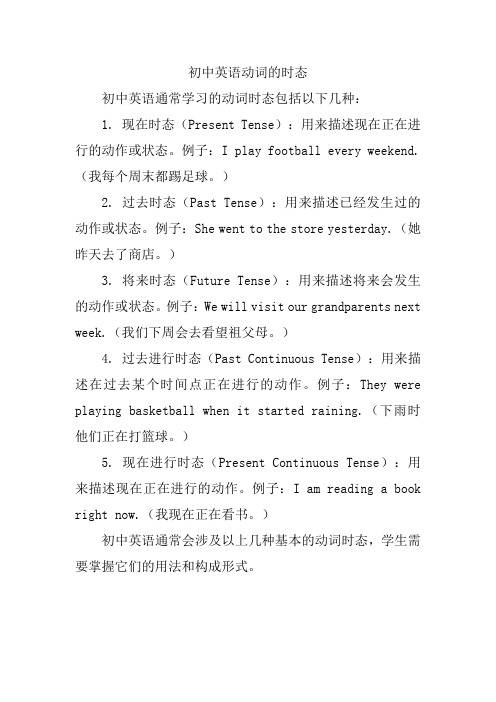
初中英语动词的时态
初中英语通常学习的动词时态包括以下几种:
1. 现在时态(Present Tense):用来描述现在正在进行的动作或状态。
例子:I play football every weekend.(我每个周末都踢足球。
)
2. 过去时态(Past Tense):用来描述已经发生过的动作或状态。
例子:She went to the store yesterday.(她昨天去了商店。
)
3. 将来时态(Future Tense):用来描述将来会发生的动作或状态。
例子:We will visit our grandparents next week.(我们下周会去看望祖父母。
)
4. 过去进行时态(Past Continuous Tense):用来描述在过去某个时间点正在进行的动作。
例子:They were playing basketball when it started raining.(下雨时他们正在打篮球。
)
5. 现在进行时态(Present Continuous Tense):用来描述现在正在进行的动作。
例子:I am reading a book right now.(我现在正在看书。
)
初中英语通常会涉及以上几种基本的动词时态,学生需要掌握它们的用法和构成形式。
2023中考英语语法复习之考点专题——动词时态(原卷版)
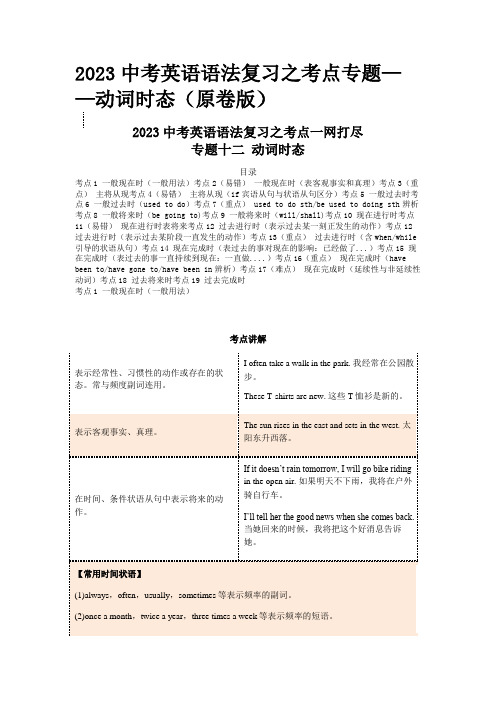
2023中考英语语法复习之考点专题——动词时态(原卷版)2023中考英语语法复习之考点一网打尽专题十二动词时态目录考点1 一般现在时(一般用法)考点2(易错)一般现在时(表客观事实和真理)考点3(重点)主将从现考点4(易错)主将从现(if宾语从句与状语从句区分)考点5 一般过去时考点6 一般过去时(used to do)考点7(重点) used to do sth/be used to doing sth辨析考点8 一般将来时(be going to)考点9 一般将来时(will/shall)考点10 现在进行时考点11(易错)现在进行时表将来考点12 过去进行时(表示过去某一刻正发生的动作)考点12 过去进行时(表示过去某阶段一直发生的动作)考点13(重点)过去进行时(含when/while 引导的状语从句)考点14 现在完成时(表过去的事对现在的影响:已经做了...)考点15 现在完成时(表过去的事一直持续到现在:一直做....)考点16(重点)现在完成时(have been to/have gone to/have been in辨析)考点17(难点)现在完成时(延续性与非延续性动词)考点18 过去将来时考点19 过去完成时考点1 一般现在时(一般用法)考点讲解1.(2021·上海松江·二模)Tim likes watching films. He _________ to the cinema with his girlfriend once a week.A.goes B.is going C.has gone D.will go2.(2020·湖北恩施)I hear that it often ________ in Sichuan and there are usually floods, especially in summer.A.rains B.rained C.will rain3.(2021·北京房山·二模)Mary ________ her grandparents every weekend.A.visits B.was visiting C.is visiting D.has visited4.(2021·广西桂林)The zebra eats grass, but it ________ eat meat.A.doesn’t B.didn’t C.don’t5.(2021·黑龙江·齐齐哈尔市碾子山区教师进修学校一模)—Do you like the flower? —Yes. It ________ sweet.A.is smelling B.smells C.smelt考点2(易错)一般现在时(表客观事实和真理)考点讲解精选练习6.(2020·天津红桥·二模)In the past, people didn't know the earth ________round the sun. A.going B.goes C.will go D.go7.(2021·吉林长春·模拟预测)The teacher told us that the sun ________ in the east. A.rises B.rise C.rose D.rising考点3(重点)主将从现考点讲解精选练习8.(2021·四川乐山)—What’s your plan for the summer holiday?—I’ll go to Chendu as soon as the school term ___________.A.end B.ends C.will end9.(2021·广西河池)Mrs. Green will take her son to the amusement park if she ________ the tickets.A.got B.gets C.is getting D.will get10.(2021·辽宁丹东)We can’t avoid traffic accidents unless everyone ________ the rules. A.follows B.breaks C.will follow D.will break考点4(易错)主将从现(if宾语从句与状语从句区分)考点讲解精选练习11.(2021·辽宁鞍山)—Tina wants to know if you ________ to the park with us tomorrow. —I’d love to. But if it ________, I may go to the library instead.A.go; will rain B.go; rains C.will go; rains D.will go; will rain12.(2020·黑龙江牡丹江)—I wonder if we ________a farewell party next week. —If we________it, I will call you.A.will have ; have B.have;will have C.will have; will have13.(2021·黑龙江哈尔滨)—I wonder if you ________ us for the English party tomorrow. —If I ________ free, I will go with you.A.will join, am B.will join, will be C.join, am考点5 一般过去时考点讲解精选练习14.(2021·广西贵港)—Where does Bill live? —He ________ me his address, but I can’t remember it now.A.tells B.told C.is telling D.will tell15.(2021·四川达州)— Alice has gone out. — Oh, has she? What time ________ she________?A.has; gone B.will; go C.did; go D.is; going16.(2021·江苏徐州)In my school days, I ________ a lot of reading in English every day. That was how I learned English at that time.A.do B.did C.have done D.will do17.(2021·重庆)Last Sunday my brother and I ________ our grandparents.A.will visit B.visits C.visit D.visited18.(2021·内蒙古兴安盟)— Have you ever been to Shanghai? — Of course. Actually, I________ there for six years, but now I live in Beijing.A.worked B.was working C.would work D.have worked考点6 一般过去时(used to do)考点讲解精选练习19.Mr Jiang isn’t as busy as before because there ___________no home robot to help him.A.used to be B.may be C.used to have D.may have20.I ________ in this small mountain village when I was a child.A.use to live B.used to living C.used to live D.used to life21.(2019·江苏镇江)Yao Ming, a basketball giant , ___________ water polo when he was young.A.is playing B.used to play C.is used to playing D.was playing考点7(重点) used to do sth/be used to doing sth辨析考点讲解精选练习22.(2020·湖南益阳)Diana used to _________ to work, but now she is used to ________ because the road is crowded and she wants to keep fit.A.drive; walk B.drive; walking C.driving; walk23.Dick __________ in America, but he has been ___________ Chinese food since he moved to China.A.used to live; used to eating B.is used to live; used to eat C.is used to live; used to eating D.used to living; used to eat24.—How does your brother go to school? —He ___________ ride a bike, but now he__________ there to keep fit.A.used to; is used to walk B.used to; is used for walking C.was used to; is used to walking D.used to; is used to walking考点8 一般将来时(be going to)考点讲解一般将来时表示将来某个时间要发生的动作,事情或存在的状态,也表示将来经常或反复发生的动作或事情。
初中动词的时态与语态
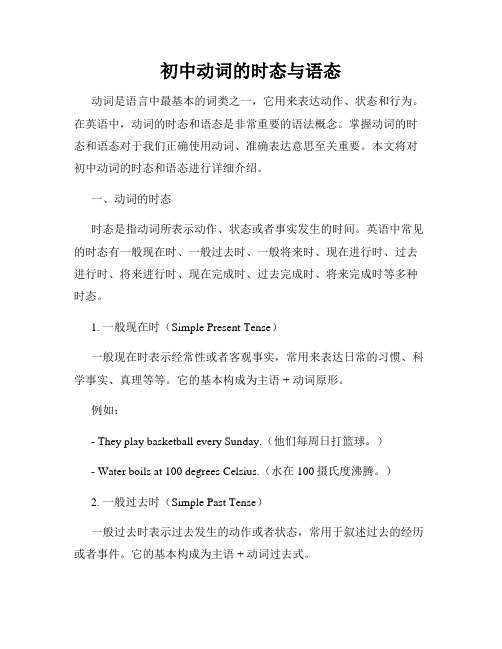
初中动词的时态与语态动词是语言中最基本的词类之一,它用来表达动作、状态和行为。
在英语中,动词的时态和语态是非常重要的语法概念。
掌握动词的时态和语态对于我们正确使用动词、准确表达意思至关重要。
本文将对初中动词的时态和语态进行详细介绍。
一、动词的时态时态是指动词所表示动作、状态或者事实发生的时间。
英语中常见的时态有一般现在时、一般过去时、一般将来时、现在进行时、过去进行时、将来进行时、现在完成时、过去完成时、将来完成时等多种时态。
1. 一般现在时(Simple Present Tense)一般现在时表示经常性或者客观事实,常用来表达日常的习惯、科学事实、真理等等。
它的基本构成为主语 + 动词原形。
例如:- They play basketball every Sunday.(他们每周日打篮球。
)- Water boils at 100 degrees Celsius.(水在100摄氏度沸腾。
)2. 一般过去时(Simple Past Tense)一般过去时表示过去发生的动作或者状态,常用于叙述过去的经历或者事件。
它的基本构成为主语 + 动词过去式。
例如:- I visited my grandparents last weekend.(我上个周末去看望了我的祖父母。
)- She didn't go to school yesterday.(她昨天没有去上学。
)3. 一般将来时(Simple Future Tense)一般将来时表示将来要发生的动作或者状态,常用于表达计划、打算、预测等等。
它的基本构成为主语 + will + 动词原形。
例如:- We will have a party next Friday.(我们下周五要举办一个聚会。
)- She won't come to the meeting tomorrow.(她明天不会来参加会议。
)4. 现在进行时(Present Continuous Tense)现在进行时表示正在进行的动作,通常用于描述当前正在发生的事情。
中考语法知识点归纳动词时态语态与非谓语动词
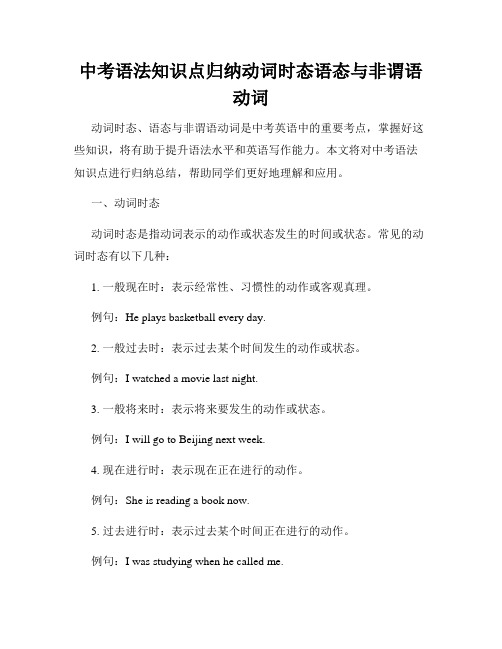
中考语法知识点归纳动词时态语态与非谓语动词动词时态、语态与非谓语动词是中考英语中的重要考点,掌握好这些知识,将有助于提升语法水平和英语写作能力。
本文将对中考语法知识点进行归纳总结,帮助同学们更好地理解和应用。
一、动词时态动词时态是指动词表示的动作或状态发生的时间或状态。
常见的动词时态有以下几种:1. 一般现在时:表示经常性、习惯性的动作或客观真理。
例句:He plays basketball every day.2. 一般过去时:表示过去某个时间发生的动作或状态。
例句:I watched a movie last night.3. 一般将来时:表示将来要发生的动作或状态。
例句:I will go to Beijing next week.4. 现在进行时:表示现在正在进行的动作。
例句:She is reading a book now.5. 过去进行时:表示过去某个时间正在进行的动作。
例句:I was studying when he called me.6. 现在完成时:表示过去的动作对现在造成的影响或结果。
例句:She has visited Paris three times.7. 过去完成时:表示对过去某个时间之前发生的动作进行的描述。
例句:They had already left when I arrived.二、动词语态动词语态是指动作发出的主体和动作所受的影响关系。
英语中常见的动词语态有以下几种:1. 主动语态:表示主语是动作的发出者。
例句:He fixed the car yesterday.2. 被动语态:表示主语是动作的承受者。
例句:The car was fixed by him yesterday.3. 进行时态:表示主语正在进行的动作处于进行状态。
例句:The book is being read by her.4. 完成时态:表示主语已经完成的动作处于完成状态。
例句:The book has been read by her.注意:被动语态需要根据动作的时态来变换,同时需要适当更改时态动词。
英语中考归纳复习专题:动词的时态
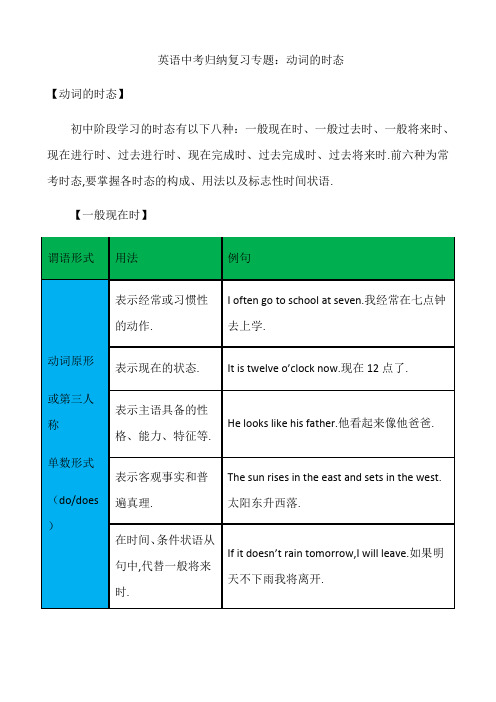
英语中考归纳复习专题:动词的时态【动词的时态】初中阶段学习的时态有以下八种:一般现在时、一般过去时、一般将来时、现在进行时、过去进行时、现在完成时、过去完成时、过去将来时.前六种为常考时态,要掌握各时态的构成、用法以及标志性时间状语.【一般现在时】【考点训练1】1.My father is a teacher and he _________ (teach) in a middle school.2.Yesterday the teacher told us the earth _______ (go) around the sun.3.—When shall we begin our meeting?—We’ll begin it when Helen ___ . ()esB.cameC.will comee4.—How do you usually go to school?—I usually ___ to school on foot. ()A.goB.wentC.was goingD.will go答案:teaches goes A A【一般过去时】要点提醒:“used to+动词原形”表示过去的习惯或状态.如:Mum used to tell us stories.妈妈过去常给我们讲故事.【考点训练2】1.Mike ________ (not go) to bed until 12 o’clock last night.2.He asked if I _____ (be) a student.3.Will you please say it again?I ___ quite ___ you.()A.don’t;hearB.didn’t;hearC.don’t;heardD.didn’t;heard4.He _____ go out with his parents,but now he ____ staying at home alone. ()ed to;is used toB.is used to;used toe to;is used toed to;used to答案:didn’t go was B A【一般将来时】要点提醒:be going to与will的区别1.be going to 指已计划好的事或思考过的意图、打算,will表示未事先思考或未计划而临时做出的决定.如:I’m going to see him tomorrow.我打算明天去看他.(事先经过思考)I’ll answer the door.我去开门.(未经事先考虑)2.be going to可表示客观迹象表明马上要发生的事,而will则表明说话者的主观意愿.如:Look at the clouds.There is going to be a storm.看看这些云,暴风雨就要来了.(客观迹象表明要发生)I hope it will be warm tomorrow.我希望明天会暖和起来.(主观意愿)3.在含有条件状语从句的复合句的主句中,一般用will,不用be going to. 如:I will come if it doesn’t rain.如果不下雨的话,我就来.【考点训练3】1.____ a concert in our school next Saturday. ()A.There isB.There areC.There will beD.There will have2.If they can arrive by 9:00 am,we ___ a meeting.()A.haveB.will haveC.hadD.would have3.He ___ her a beautiful hat on her next birthday.()A.givesB.gaveC.will givingD.is going to give答案:C B D 【现在进行时】【考点训练4】1.They ____________ (have) a math test in the classroom now.2.Look! He ___________ (lie) on the beach.3.—Pass the raincoat to me.It ___ hard now.—Here you are. ()A.rainB.is rainingC.rainedD.will rain4.—Cathy,can you answer the door?I ___ the room.—I’m coming,Mum. ()A.CleanB.cleanedC.have cleanedD.am cleaning答案:are having is lying B D【过去进行时】He was forever com plaining about something.他老是怨这怨那.要点提醒:1.在含有时间状语从句的复合句中,延续时间较长的动作常用过去进行时,另一个短暂性动作用一般过去时.如:When the UFO landed,I was shopping at the clothes store.当UFO落地时,我正在服装店买衣服.2.表示两个延续性动作在过去某一时刻同时进行,不考虑动作的先后顺序,主句和从句的谓语动词都用过去进行时,连词常用while.如:Tom was doing his homework while I was reading a newspaper.我在看报纸时,汤姆在做作业.【考点训练5】1.Mike and I ___________ (play) basketball at that time yesterday afternoon.2.While Mr.Johnson _______________ (work) in the office,the phone rang.3.The girl ___ for the bus when the rainstorm came.()A.waitedB.have waitedC.is waitingD.was waiting4.—Jenny,I called you at nine last night,but you didn’t pick up.—Oh,I ____ a popular program called Go Fighting!.()A.watchB.watchedC.was watchingD.am watching答案:were playing was working D C【现在完成时】要点提醒:1.have/has been to,have/has gone to与have/has been in(考点讲解详见P74考点1)2.延续性动词与非延续性动词英语中的动词按动作发生的方式、发生过程的长短可分为延续性动词和非延续性动词两种,非延续性动词也可称为短暂性动词或瞬间动词.在现在完成时态中,有时要将非延续性动词转换为延续性动词,这样才能和时间段连用.转换方法如下:(1)将短暂性动词转换为“be+形容词或副词”.请看下表:如:这间商店开门6小时了.The shop has opened for 6 hours.( ×)The shop has been open for 6 hours.( √)(2)有的短暂性动词可以转换为意思相同的延续性动词.请看下表:如:这本书我借了一个月了.I have borrowed the book for one month.( ×)I have kept the book for one month.( √)3.现在完成时与一般过去时的区别现在完成时强调某一动作或状态对现在造成的影响或结果,不能和表示过去的时间状语连用;一般过去时只表示过去的事实,不表示和现在的关系,可以和表示过去的时间状语连用.如I bought a ticket yesterday.我昨天买了一张票.(强调我昨天做的一件事是买票)I have already bought a ticket.我已经买了一张票.(强调我已经有票了,无须再惦记票的事了)4.现在完成时的其他句型【考点训练6】1.—you _____ your homework yet?—Yes.I ______ it a moment ago. ()A.Did;do;finishedB.Have;done;finishedC.Have;done;have finishedD.Will;do;finish2.His father ___ the Party since 1978. ()A.joinedB.has joinedC.was inD.has been in3.Miss Green isn’t in the office.She to the library. ()A.has goneB.wentC.will goD.has been 答案:B D A【过去完成时】had + 过去分词表示在过去的过去发生的动作或存在的状态.I had had three pieces of cake when you arrived.你来的时候我已经吃了三块蛋糕了.表示过去某一动作或状态持续到过去另一时间.The old man had lived in Shanghai for ten years beforeTom came here.汤姆来这儿之前,这个老人已经住在上海十年了.时间标志by the time...,before,when等构成的短语或引导的从句【考点训练7】1.在我们到达电影院之前,电影已经开始了.The film __________ before we _______ to the cinema.2.警察赶到时,小偷已经逃跑了.When the police __________,the thief____________________ .答案:had begun got arrived had run away 【过去将来时】【考点训练8】1.李明说如果布莱恩下个月来中国,他将会很高兴.Li Ming said he ___________ happy if Brian came to China the next month.2.蒂娜说她下周三打算来参加我的生日派对.Tina said she ________________ my birthday party the next Wednesday.答案:would be was going to【中考示例】(2017·广西)If he _____ Guilin,he’ll probably go to Yangshuo. ( )A.visitsB.is visitingC.will visitD.has visited【解析】考查动词的时态.句意:如果他游览桂林,他有可能会去阳朔.if引导条件状语从句时,时态遵循“主将从现”原则,从句中用一般现在时表示将来.【考题热身】1.(2017·甘肃)I promise I ________ (send) you an email to explain all of these tomorrow.2.(2017·甘肃)Be quiet! The patients ______________(sleep).3.(2017·鄂州)Sandy’s grandparents__________________ (marry) for 50 years.4.(2017·台州改编)A true friend always ____________(support) you whenever youare in trouble.5.(2017·宿迁)I ______________(wash) the dishes while my sister was sweeping the floor.6.(2017·云南)—What do you think of your hometown, Kate?—It a lot.It’s more beautiful than before. ()A.has changedB.changesC.will changeD.change7.(2017·武汉)—Linda is not coming for the party tonight.—But she ______!()A.promisesB.promisedC.will promiseD.had promised8.(2017·毕节)It’s nice to see you again.We ___ each other since 2016. ()A.won’t seeB.haven’t seenC.don’t seeD.didn’t see9.(2017·黔东南)If it doesn’t rain this weekend,we ___ a picnic in the Jinquan Park. ()A.haveB.will haveC.have hadD.had10.(2017·上海)Some exchange students ___ with their host families this time yesterday. ()A.are chattingB.will chatC.were chattingD.have chatted11.(2017·重庆B卷)—Where is your uncle?I haven’t seen him for a long time. —He _____ Beijing for about half a year.He moved there in January. ()A.has gone to B.has been toC.has arrived inD.has been in12.(2017·重庆B卷)John and I ___ to visit his grandparents last Sunday afternoon. ()A.goB.wentC.will goD.have gone13.(2017·重庆A卷)In the past few years,many schools ____ the ways of doing morning exercises. ()A.changeB.changesC.will changeD.have changed14.(2017·重庆A卷)As soon as the rain _____ ,they will go out to pick apples. ()A.stopsB.stoppedC.will stopD.is stopping15.(2017·河北)Don’t take the dictionary away.I ___ it. ()eedC.am usingD.have used答案:will send are sleeping have been married supports A B BBCDBDAC。
动词的时态和语态知识总结

动词的时态和语态知识总结一、动词的时态时态是指动词所表示的动作或状态发生的时间。
英语中常用的时态有以下几种:一般现在时、一般过去时、一般将来时、现在进行时、过去进行时、将来进行时、现在完成时、过去完成时、将来完成时等。
1. 一般现在时一般现在时表示经常性、习惯性的动作或客观事实。
常与频率副词如always、often、usually等连用。
例如:- I often go to the gym.- He always arrives on time.2. 一般过去时一般过去时表示过去某个时间发生的动作或存在的状态。
常与表示过去的时间状语连用。
例如:- I visited my grandparents last weekend.- She lived in Paris for two years.3. 一般将来时一般将来时表示将来某个时间要发生的动作或存在的状态。
常与表示将来的时间状语连用。
例如:- We will have a meeting tomorrow.- He is going to travel to Japan next month.4. 现在进行时现在进行时表示现在正在进行的动作。
常由be动词的现在分词形式(-ing)构成。
例如:- They are watching a movie right now.- I am studying for my exams.5. 过去进行时过去进行时表示过去某个时间正在进行的动作。
常由be动词的过去分词形式(-ing)构成。
例如:- She was cooking dinner when I arrived.- They were playing football at that time.6. 将来进行时将来进行时表示将来某个时间正在进行的动作。
常由be动词的将来分词形式(be going to + 动词的现在分词形式)构成。
例如:- They will be having a party this time next week.- I am going to be studying abroad next year.7. 现在完成时现在完成时表示过去某个时间发生的动作对现在造成的影响或结果。
(详细版)初中英语动词时态和语态讲解
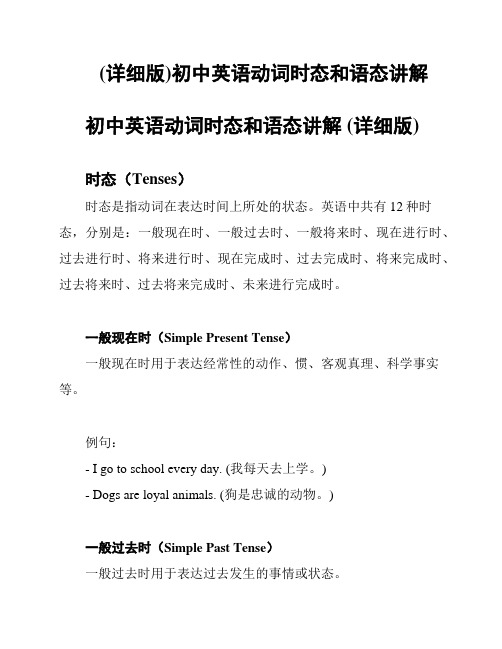
(详细版)初中英语动词时态和语态讲解初中英语动词时态和语态讲解 (详细版)时态(Tenses)时态是指动词在表达时间上所处的状态。
英语中共有12种时态,分别是:一般现在时、一般过去时、一般将来时、现在进行时、过去进行时、将来进行时、现在完成时、过去完成时、将来完成时、过去将来时、过去将来完成时、未来进行完成时。
一般现在时(Simple Present Tense)一般现在时用于表达经常性的动作、惯、客观真理、科学事实等。
例句:- I go to school every day. (我每天去上学。
)- Dogs are loyal animals. (狗是忠诚的动物。
)一般过去时(Simple Past Tense)一般过去时用于表达过去发生的事情或状态。
例句:- We visited Paris last summer. (去年夏天我们参观了巴黎。
)- She lived in Japan for two years. (她在日本住了两年。
)一般将来时(Simple Future Tense)一般将来时用于表达将来将要发生的事情或状态。
例句:- I will call you tomorrow. (我明天会打电话给你。
)- They are going to travel to Europe next month. (他们下个月要去欧洲旅行。
)现在进行时(Present Continuous Tense)现在进行时用于表达正在进行的动作。
例句:- She is studying for her exams. (她正在为考试而研究。
)- They are playing soccer in the park. (他们正在公园里踢足球。
)过去进行时(Past Continuous Tense)过去进行时用于表达过去某个时间正在进行的动作。
例句:- We were watching a movie when the power went out. (停电时我们正在看电影。
初中英语语法:动词时态讲解及练习
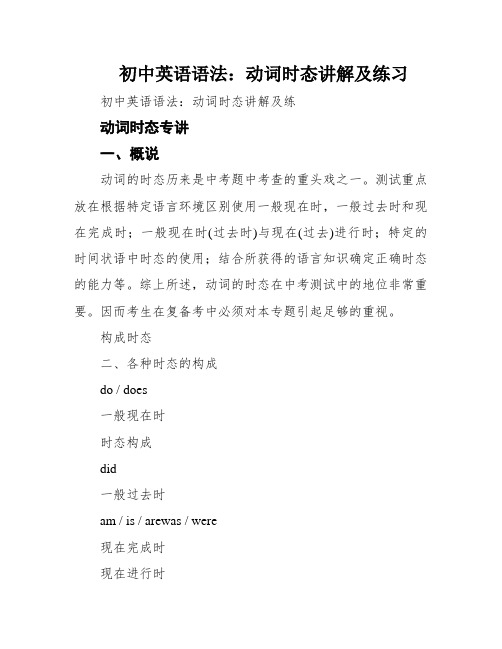
初中英语语法:动词时态讲解及练习初中英语语法:动词时态讲解及练动词时态专讲一、概说动词的时态历来是中考题中考查的重头戏之一。
测试重点放在根据特定语言环境区别使用一般现在时,一般过去时和现在完成时;一般现在时(过去时)与现在(过去)进行时;特定的时间状语中时态的使用;结合所获得的语言知识确定正确时态的能力等。
综上所述,动词的时态在中考测试中的地位非常重要。
因而考生在复备考中必须对本专题引起足够的重视。
构成时态二、各种时态的构成do / does一般现在时时态构成did一般过去时am / is / arewas / were现在完成时现在进行时一般将来时am / is / are + doinghave / has + doneshall / will + do曩昔完成时过去进行时过去将来时was / were + doingwould + dohad + donewas / were going + to doam / is / are going + to do普通目前时三、各种时态的用法1.透露表现经常性或气性的举措,常与透露表现频度的工夫状语连用。
时间状语:every day,every other day,sometimes,often,usually,on Sunday …I leave home for school at 7 _________________ (天天清晨).The Olympic Games are held ____________________ (每四年).What do you ____________ (平日) do when you are free on Sunday?2.用在客观真理,客观存在,科学事实或格言警句中。
The earth _________________ (绕着……转) the sun.Shanghai lies in the east of China.上海__________中国的东方。
英语动词的十二种时态

英语动词的十二种时态-CAL-FENGHAI.-(YICAI)-Company One1十二种时态形式①一般现在时:定义:表示现在阶段习惯性或经常性发生的动作或存在的状态。
构成: to do, to have, to be.Eg. I do it every day.(我每天做这样的事。
)②现在进行时:定义:表示正在进行或发生的动作。
构成:助动词be+现在分词。
Eg. I am doing it now.(现在我正在做这件事。
)③现在完成时:定义:表示过去某一动作对现在的影响或过去某一动作持续到现在,也可能还要继续下去。
构成:have/has+过去分词。
Eg. I have done it already.(我已把这件事做好了。
)④现在完成进行时:定义:表示动作从过去某一时间开始,一直延续到现在,可能还要继续下去。
构成:have/has been+现在分词。
Eg. I have been doing it for two days.(这件工作我已做了两天了。
──说话时工作尚未做完,所以还得继续做)。
⑤一般过去时:定义:表示过去某时发生的动作或存在的状态。
构成:动词+ed。
Eg. I did it yesterday.(昨天我做了这件事。
)⑥过去进行时:定义:表示过去某一时刻或某一阶段内正在进行的动作。
构成:was/were+现在分词。
Eg. I was doing it at that time.(当时我正在做这件事。
)⑦过去完成时:定义:表示在过去某一时刻以前已经完成的动作,强调“过去的过去”。
构成:had+过去分词。
Eg. I have done it before I went home yesterday.(昨天我在回家之前就把那件工作做完了)。
⑧过去完成进行时:定义:表示动作从过去,某一时间之前开始,到某一时间仍在进行或刚刚结束。
构成:had been+现在分词。
Eg. I had been doing the work for two hours when the teacher came.(老师来时那件工作我已做了两小时了。
初三知识点总结动词时态
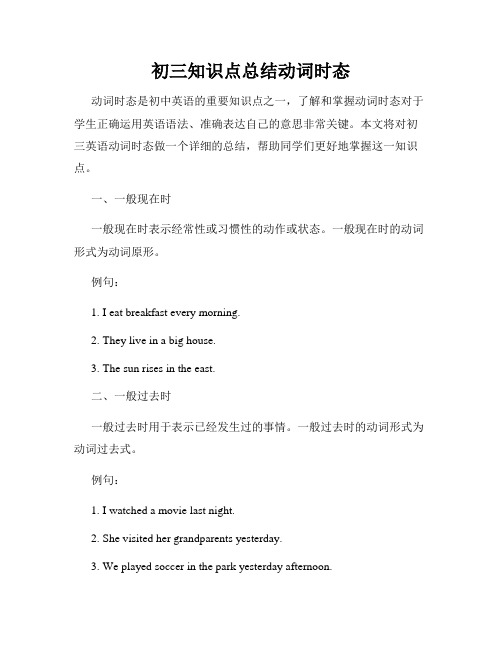
初三知识点总结动词时态动词时态是初中英语的重要知识点之一,了解和掌握动词时态对于学生正确运用英语语法、准确表达自己的意思非常关键。
本文将对初三英语动词时态做一个详细的总结,帮助同学们更好地掌握这一知识点。
一、一般现在时一般现在时表示经常性或习惯性的动作或状态。
一般现在时的动词形式为动词原形。
例句:1. I eat breakfast every morning.2. They live in a big house.3. The sun rises in the east.二、一般过去时一般过去时用于表示已经发生过的事情。
一般过去时的动词形式为动词过去式。
例句:1. I watched a movie last night.2. She visited her grandparents yesterday.3. We played soccer in the park yesterday afternoon.三、一般将来时一般将来时表示将要发生的动作或存在的状态。
一般将来时的动词形式为“will + 动词原形”。
例句:1. I will go to the beach tomorrow.2. They will visit their friends next week.3. She will study hard for the exam.四、现在进行时现在进行时表示现在正在进行的动作。
现在进行时的动词形式为“be + 动词-ing”。
例句:1. He is playing basketball in the park.2. We are studying English at the moment.3. They are watching a movie right now.五、过去进行时过去进行时表示过去某一时间段内正在进行的动作。
过去进行时的动词形式为“was / were + 动词-ing”。
中考英语语法动词的时态复习讲义及总结与整理
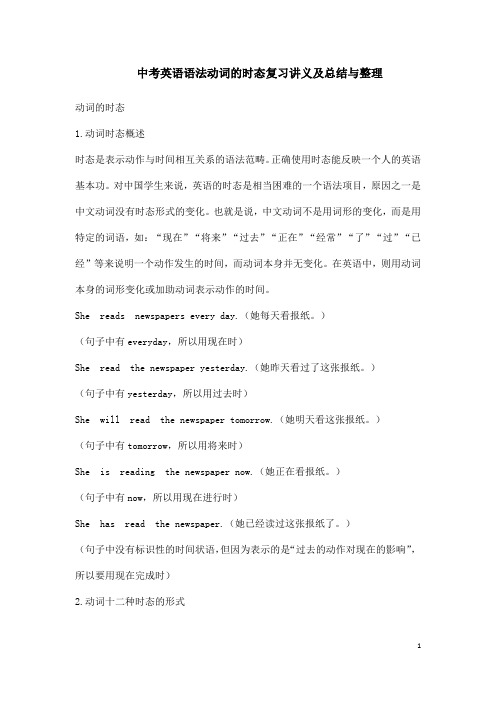
中考英语语法动词的时态复习讲义及总结与整理动词的时态1.动词时态概述时态是表示动作与时间相互关系的语法范畴。
正确使用时态能反映一个人的英语基本功。
对中国学生来说,英语的时态是相当困难的一个语法项目,原因之一是中文动词没有时态形式的变化。
也就是说,中文动词不是用词形的变化,而是用特定的词语,如:“现在”“将来”“过去”“正在”“经常”“了”“过”“已经”等来说明一个动作发生的时间,而动词本身并无变化。
在英语中,则用动词本身的词形变化或加助动词表示动作的时间。
She reads newspapers every day.(她每天看报纸。
)(句子中有everyday,所以用现在时)She read the newspaper yesterday.(她昨天看过了这张报纸。
)(句子中有yesterday,所以用过去时)She will read the newspaper tomorrow.(她明天看这张报纸。
)(句子中有tomorrow,所以用将来时)She is reading the newspaper now.(她正在看报纸。
)(句子中有now,所以用现在进行时)She has read the newspaper.(她已经读过这张报纸了。
)(句子中没有标识性的时间状语,但因为表示的是“过去的动作对现在的影响”,所以要用现在完成时)2.动词十二种时态的形式英语动词共有十六种时态,一般语法书列出的英语动词的十二种时态为“现在”“过去”和“将来”三大类;每类中又分为“一般”“进行”“完成”“完成进行”四种,共十二种,下面以study为例,列表说明。
注意:初中阶段最常用的时态有5种,即一般现在时、一般过去时、现在进行时、一般将来时和现在完成时。
在下面的文章中,将分别讲述各种时态的具体用法。
不规则动词变化表例题:( )1. —When did you meet him? —While I ____ on the street.A. walksB. walkC. was walkingD. am walking( )2. —Mum, why don't you go to sleep? —Your sister ____ yet. I ____ for her.A. hasn't come back; am waitingB. didn't come back; was waitingC. hadn't come back; was waitingD. came back; waited( )3. —King White ___ in our company for 20 years.—Yes, and she ___ here when she was 21 years old.A. has worked; has comeB. worked; comesC. worked; cameD. has worked; came( )4. —Don't forget to visit me when you come here.—OK. I ___ you a call as soon as I ____ there.A. gave; getB. will give; will getC. give; will getD. will give; get( )5. —What did you do last summer vacation?—Don't mention it. I ____ always ____ my parents on the farm.A. was; helpingB. / ; helpedC. would; helpD. have; helped( )6. —Would you like to see the movie? —No, thanks.I ____ it twice.A. have seenB. seenC. sawD. had seen( )7. —Are you still single? —No, I ____ for two months.A. have been marriedB. have marriedC. was marryingD. married( )8. —We will do some cleaning if the weather ___ fine tomorrow.—But I think it ____ rain.A. will be; is going toB. is; is going toC. is; hasD. will be; has( )9. —Mike is preparing his luggage. —Yes. He _____ for Canada on vacation.A. leavesB. leftC. is leavingD. has been away( )10. —Be quiet. Dad ___ in the next room. —Sorry.A. sleepsB. sleptC. is sleepingD. was sleeping参考答案:1-5 CADDA 6-10 AABCC。
- 1、下载文档前请自行甄别文档内容的完整性,平台不提供额外的编辑、内容补充、找答案等附加服务。
- 2、"仅部分预览"的文档,不可在线预览部分如存在完整性等问题,可反馈申请退款(可完整预览的文档不适用该条件!)。
- 3、如文档侵犯您的权益,请联系客服反馈,我们会尽快为您处理(人工客服工作时间:9:00-18:30)。
拓展训练2020年中考英语专题分类卷专题十二动词的时态(一)( )1. (2018 .长沙)As long as the whole of our society ____________ trying, we will make our skies blue again.A. keepsB. will keepC. kept( )2. (2018 .河北) Gary is the best singer in my class. No one else______so well.A. singsB. sangC. will singD. is singing( )3. (2018 .安徽) Before the sun ______,we need to get to the top of the mountain.A. setB. setsC. is settingD. will set( )4. (2018 .北京) Bill likes reading. He ______ picture books with his dad every evening.A. readB. readsC. is readingD. has read( )5.If it_____sunny tomorrow, I will go shopping with my friend in the supermarket.A. will beB. beC. isD. was( )6. Unless the weather ______, we'll have to cancel the picnic.A. improveB. improvesC. improvedD. will improve( )7. -Who is that lady?-She's Miss Green. She _____us music, and she is so good.A. taughtB. teachesC. will teachD. is teaching( )8. Don't worry. Bill will help you look after your dog when you_______away on business.A. areB. wereC. will heD. have been( )9. -1 think I'll take a bus to the meeting.-The bus? If you______, you will be late.A. doB. have doneC. will doD. does( )10. Alice prefers stories that ______ short and funny.A. areB. isC. wasD. were( )11. Grandpa ______ glasses when he reads.A. wearsB. woreC. has wornD. was wearing( )12. We will go to Tian'anmen Square to watch the raising of national flag if it ______ ______ tomorrow.A. will rainB. rainsC. doesn't rainD. won't rain( )13. Many city people ______ their bikes to work every day.A. rideB. will rideC. rodeD. have ridden( )14.I will send you an e-mail as soon as I ____________ in London.A. arrivedB. arriveC. will arriveD. arrives( )15. (2018 .绥化) He ______ his grandparents in the countryside last week.A. visitsB. visitC. visited( ) 16. (2018 .重庆A) They don't live here any longer. They ______ to Chengdu last month.A. moveB. movedC. will moveD. are moving( )17. (2018 .哈尔滨)-I have seen the film The Jurassic World H《侏罗纪世界Ⅱ》. It's very interesting.-Really? When ____________ you ____________ it?A. have, seenB. did, seeC. will,see( )18. (2018 .天津)-Jerry, have you ever been to the Great Wall?-Yes.I ______ there with my parents last year.A. goB. wentC. will goD. have gone( )19. (2018 .河北)-The bread is really delicious.-Thank you.I ____________ it myself.A. makeB. madeC. will makeD. am making( ) 20. (2018 .北京) David is a tennis player. He ______ to play tennis when he was six years old.A. beginsB. will beginC. BeganD. has begun( )21.(2017 .上海) Several journalists ______the lawyer about the international case an hour ago.A. interviewB. interviewedC. will interviewD. had interviewed( )22. -There is someone knocking at the door.-It must be the computer repairman.l ______ him to come to fix my computer.A. callB. have calledC. calledD. will call( )23. -Sorry, Tom.I can't find the book you ______me.-It's OK.I don't need it any more.A. lendB. have lentC. will lendD. lent( )24. My mind wasn't on what he was saying so I'm afraid I ______ half of it.A. MissedB. was missingC. will missD. would miss( )25. Oh,no !I ______ the book in the lab.A. leaveB. leftC. will leaveD. was leaving( )26. -Have you read this book?-Yes, I______ it two months ago.A. is readingB. have readC. will readD. read( )27. -Your coat fits you well.-Thank you.I ______ it when I was on vacation.A. have boughtB. buyC. boughtD. will buy( )28. -Oh,no !I can't find my mobilephone !-Well, where ____________ you last put it?A. haveB. doC. did( )29. (2018南京)-We ______ to Yun Brocade Museum with the exchange students this coming summer holiday.-That's amazing !A. wentB. goC. have goneD. will go( )30.(2018 .江西)We ______ ______ a party for Kate. It's supposed to be a surprise.A. were havingB. hadC. will haveD. have had( )31. Just go down the road, and you ______ the library next to the bank.A. seeB. sawC. have seenD. will see( )32. We ______ have a picnic together with our teachers next Thursday.A. are goingB. are going toC. will goingD. may going to( )33.With the development of science and technology, robot cooks______ in our families in the future.A. appearB. appearedC. will appearD. were appearing( )34. Many scientists believe that robots ______ able to talk like humans in 50 years.A. wereB. areC. will beD. have been( )35.I ______Chinese dishes for my foreign friends tomorrowevening.A. will cookB. have cookedC. cookD. cooked( )36. -Did you call Jenny?-Oh no, I forgot.I ______ her right away.A. calledB. have calledC. callD. will call( )37. We ______ for a picnic if it ______ ______ rain this Sunday.A. will go; doesn'tB. will go; won'tC. go; doesn't ( )38. The kids may not go to school in the future. They ______at home on computers.A. have studiedB. will studyC. studied( )39. -Do you have any plans for tonight?-Yes, I ______ at the new Italian restaurant in town.A. eatB. have eatenC. ateD. am going to eat( )40. -Have you watched the new movie Jurassic World,Steven ?-Not yet.I ______ it with my cousin this evening.A. will watchB. was watchingC. watchedD. have watched(二)( )1. (2018 .邰阳)-Where is Jim?-Look! He ______under the tree.A. is standingB. stoodC. stands( )2. (2018 .海南)-May I use your computer?-Sorry.I ______ on it.A. workB. am workingC. have worked( )3. (2017 .河北) Don't take the dictionary away. I it.A. useB. usedC. am usingD. have used( )4. (2017 .河南)-Paul,I'm busy cooking. Can you give a hand?-Just a minute. I my e-mail.A. am checkingB. will checkC. have checkedD. was checking( )5.Please don't make so much noise.The baby ______now.A. sleepsB. sleptC. will sleepD.is sleeping( )6. -Where are you going,Bob?-To go hiking. Eric ______ for me at the school gate !A. was waitingB. waitsC. waitedD. is waiting( )7. Don't enter the area. The students ____________ an English exam.A. takesB. are takingC. have takenD. took( )8. -May I speak to Mrs. Black?-Sorry, mum can't come to the phone now. She ______ a shower.A. hasB. hadC. is havingD. was having( )9. -Lily, where is your father now? Go and get him for lunch.-Just a moment, please. Father ______ a phone call in his room.A. makesB. is makingC. was makingD. made( )10. -Pass the raincoat to me, please.It ______ hard now.-Here you are.A. is rainingB. rainedC. will rainD. rain( )11.Everyone wants to reach the top of the mountain, but all the happiness happens while you ______ it.A. climbB. climbedC. are climbingD. have climbed( )12. (2018 .绥化)I ______ ______this magazine for three months. A. have bought B. have hadC. have borrowed( )13. (2018 .武汉)-Do you still play basketball?-Oh, no.I ______it for the past two years.A. haven't playedB. didn't playC. won't playD. hadn't played( )14.(2018.呼和浩特) Diana can't go to the farm with her classmates because she ______ a bad cold.A. will catchB. is catchingC. has caughtD. is caught( )15. (2018 .青岛)-It's time to work now.-OK.I'll wake Carl up. He ______ for an hour.A. has fallen asleepB. has been asleepC. fell asleepD. falls asleep( )16.(2018 -福建) China ______ great achievements in science and technology since 1978.A. makesB. madeC. has made( )17. (2018 .广东)It is said that the number of forest parks in Guangdong______ to more than 1,000 so far.A increase B. increasedC. has increasedD. will increase( )18. (2018 .河北)I an invitation to the concert. I can't wait to go.A. receiveB. will receiveC. was receivingD. have received( )19. (2018 .北京)-Lucy,is your uncle a teacher?-Yes,he is. He ______ history for nearly 20 years.A. teachesB. has taughtC. is teachingD. will teach( )20. Wow! You ____________ dinner! Let's eat now.A. cookB. are cookingC. will cookD. have cooked( )21.I am surprised at the new look of my hometown, for it______ a lot over the years.A. changedB. changesC. will changeD. has changed( )22.It's nice to see you again. We ______ each other since 2014.A. won't seeB. don't seeC. haven't seenD. didn't see( )23.School violence (暴力) much attention of the whole society and people are calling on the government to make laws against it as early as possible.A. drewB. will drawC. has drawnD. was drawing( )24. Our team ______ another point! I'm sure we'll win the game. A. will get B. has gotC.is gettingD. was getting( )25.I don't feel very well, Jack. I'm afraid you______ me your cold.A. giveB. had givenC. have givenD. would give( )26. -Jenny, when did you move here?-I here for three years.A. livedB. movedC. have movedD. have lived( )27. -How do you like Treasure Island, Lucy?-It's so exciting that I ____________ it twice.A. am readingB. have readC. was readingD. had read( )28. -Hobo and Eddie ______ the cinema to watch the film Zootopia. -Oh, that's why I can't find them now.A. have gone toB. have been toC. has gone toD. has been to( )29. -Peter, you speak Chinese so well.-Thank you. I Chinese since I came here in 2013.A. will learnB. learnedC. have learnedD. learn( )30. Look !Someone the icebox back to the comer.-Well, it wasn't me.I didn't do it.A. has movedB. is movingC. was movingD. moves( )31.I ______scared of dogs ever since a dog hurt me when I was five years old.A. will beB. WasC. have beenD. would be( )32.-Amy, can we give away these soft toys? We ______ them for many years.-Mom, but I want to keep the bear.A. boughtB. hadC. have boughtD. have had( ) 33. I heard a new song on the radio. I____ high and low in the music store, but I can't find the song.A. SearchB. have searchedC. am searchingD. will search( )34. (2018 .黔南州) Mary ______ ______ a math problem with her classmates when the math teacher knocked at the classroom door. A. has discussed B. was discussedC. was discussingD. discusses( )35. (2018 .成都)Yesterday,I ______the subway home when I suddenly found I was on the wrong line.A. tookB. was takingC. had taken( )36. (2018 .白银) She ______ ______ an English magazine when I came in.A. readsB. had readC. will readD. was reading( )37. (2018 .江番)-I saw the light of your room was still on at two o'clock last night.-Oh, I ____________a football match of the Russia World Cup.A. WatchedB. was watchedC. am watchingD. was watching( )38. (2018 .北京)-Paul,what were you doing at nine last night?-I_______a movie in the cinema with my friends.A. was watchingB. watchC. have watchedD. will watch( )39. (2017 .西宁)-I called you this morning, but nobody answered. -I____flowers in my garden at that time.A. wateredB. was wateringC. waterD. am watering( )40. ( 2017 .上海) Some exchange students ______ with their host families this time yesterday.A. are chattingB. will chatC. were chattingD. have chatted( )41. (2017 .武威) We ______ ______ TV from seven to nine last night.A. were watchingB. willC. watchedD. watch( )42. -I called you yesterday evening. But nobody answered.-Oh, sorry. Maybe I _______in the bathroom at that time.A. take a showerB. took a showerC. was taking a shower( )43. -Oh,dear!A power cut !-Sorry, I didn't know you ______ the washing machine.A. are usingB. usedC. useD. were using( )44. My mother ______ dinner when I got home yesterday.A. has cookedB. was cookingC. will cook.D. cooks( )45.I saw Sam and David in the playground yesterday afternoon. They______ games with their classmates then.A. playB. will playC. are playingD. were playing( )46. -Did you see a man in black pass by just now?-No, sir.I ______ my car.A. washB. washedC. am washingD. was washing( )47. -Were you at home at 9:30 last night?-Yes.l ______ Running Man at that time. It's my favorite TV show.A. watchB. have watchedC. am watchingD. was watching( )48. I saw Jeff in the park. He________on the grass and reading a book.A. sitsB. satC. is sittingD. was sitting(一)1.A 2.A 3.B 4.B 5.C 6.B 7.B 8.A 9.A 1O.A 11.A 12.C 13.A 14.B15.C 16.B 17.B 18.B 19.B 20.C 21.B 22.C 23.D 24.A 25.B 26.D 27.C 28.C 29.D 30.C 31.D 32.B 33.C 34.C 35.A 36.D 37.A 38.B 39.D 40.A(二)1.A 2.B 3.C 4.A 5.D 6.D 7.B 8.C 9.B 1O.A 11.C 12.B 13.A 14.C 15.B 16.C 17.C 18.D 19.B 20.D 21.D 22.C 23.C 24.B 25.C 26.D 27.B 28.A 29.C 30.A 31.C 32.D 33.B34.C 35.B 36.D 37.D 38.A 39.B 40.C41.A 42.C 43.D 44.B 45.D 46.D 47.D 48.D。
